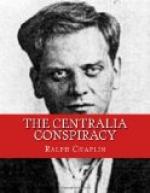“I can’t agree with you,” replied Grimm. “That’s the proper way to treat such a fellow.”
The New Black Hundred
On October 19th the Centralia Hub published an item headed “Employers Called to Discuss Handling of ‘Wobbly’ Problem.” This article urges all employers to attend, states that the meeting will be held in the Elk’s Club and mentioned the wrecking of the Union Hall in 1918. On the following day, October 20th, three weeks before the shooting, this meeting was held at the hall of the Benevolent and Protective Order of Elks—the now famous Elks’ Club of Centralia. The avowed purpose of this meeting was to “deal with the I.W.W. problem.” The chairman was William Scales, at that time Commander of the Centralia Post of the American Legion. The I.W.W. Hall was the chief topic of discussion. F.B. Hubbard opened up by saying that the I.W.W. was a menace and should be driven out of town. Chief of Police Hughes, however, cautioned them against such a course. He is reported to have said that “the I.W.W. is doing nothing wrong in Centralia—is not violating any law—and you have no right to drive them out of town in this manner.” The Chief of Police then proceeded to tell the audience that he had taken up the matter of legally evicting the industrialists with City Attorney C.E. Grimm, a brother of Warren O. Grimm, who is said to have told them, “Gentlemen, there is no law by which you can drive the I.W.W. out of town.” City Commissioner Saunders and County Attorney Allen had spoken to the same effect. The latter, Allen, had gone over the literature of the organization with regard to violence and destruction and had voluntarily dismissed a “criminal syndicalist” case without trial for want of evidence.
[Illustration: Lewis County’s Legal Prostitute
Herman Allen, prosecuting attorney of Lewis County. He stood at the corner during the raid and received papers stolen from the hall. There is no record of his having protested against any illegal action. He turned over his office to the special Prosecutors and acted as their tool throughout. During the entire trial he never appeared as an active participant.]
Hubbard was furious at this turn of affairs and shouted to Chief of Police Hughes: “It’s a damned outrage that these men should be permitted to remain in town! Law or no law, if I were Chief of Police they wouldn’t stay here twenty-four hours.”
“I’m not in favor of raiding the hall myself,” said Scales. “But I’m certain that if anybody else wants to raid the I.W.W. Hall there is no jury in the land will ever convict them.”
After considerable discussion the meeting started to elect a committee to deal with the situation. First of all an effort was made to get a workingman elected as a member to help camouflage its very evident character and make people believe that “honest labor” was also desirous of ridding the town of the hated I.W.W. Hall. A switchman named Henry, a member of the Railway Brotherhood, was nominated. When he indignantly declined, Hubbard, red in the face with rage, called him a “damned skunk.”




